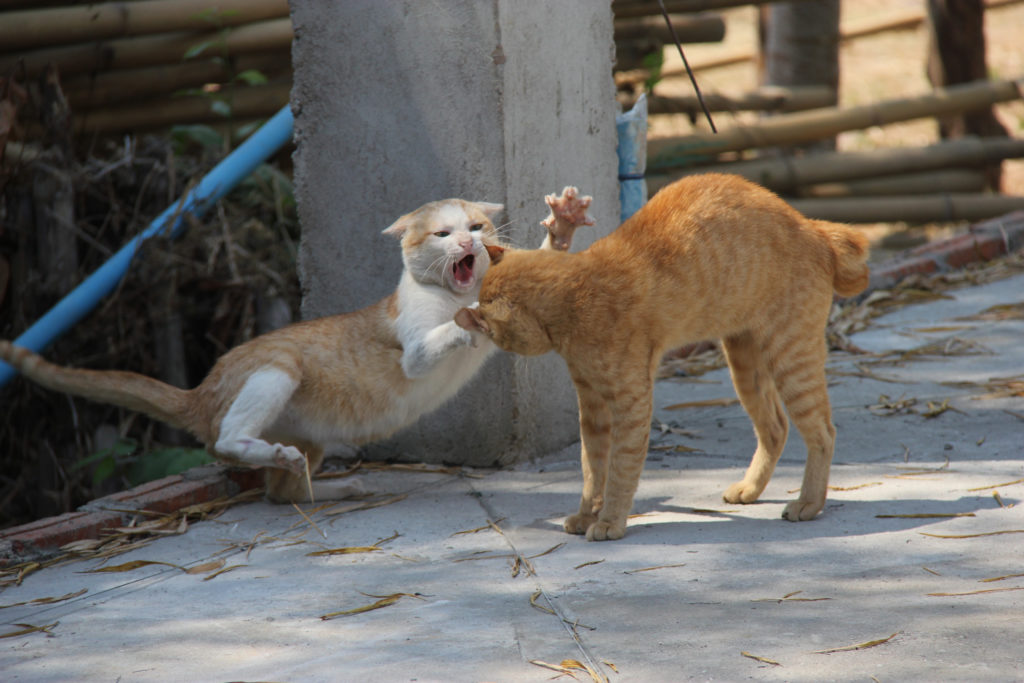If you have multiple cats in your household, then you have probably witnessed the occurrence of little fights or aggression among your feline family. Sometimes it can take you by surprise, especially if sibling cats start suddenly fighting. It is important to know that cat fights can happen regardless of whether or not your cats get along. There are several reasons why cats fight, and some of them, we humans may never understand.
Why Do Cats Fight? Why are my cats fighting all of a sudden?
Usually, cats fight with each other as a means to express their outright displeasure or general discontentment. The main reasons that cats fight can be broken down into 4 categories: Social Ranking, Health, Territory Marking, and Mere Aggression. Knowing why cats respond aggressively or engage in any confrontation with other cats is a sure way to determine how to stop cats from fighting in the future.
Social Ranking
Cats sometimes pick up fights to establish superiority or dominance. This type of conflict is commonplace if you have multiple males in your feline family. Each male cat in the pack naturally seeks to rank topmost in the hierarchy as the “Alpha Male,” which is a common reason why male cats are fighting.
These cat fight noises often feature a lot of posturing, and some screaming and howling with each cat moving around in a back and forth manner. They might eventually get into wrestling if one lunges forward to attack, and this can go on for several rounds. However, they might end up not fighting at all if one backs down in surrender.
Usually, they do not cause any injuries or do any significant damage to each other during this type of fight. Hence, in most cases, you need not intervene.
Ill Health
Just like humans, cats also get easily agitated when they are ill or in pain. When a cat is sick, he may respond aggressively to another cat who is trying to play with him. Ideally, this type of behavior from your cat should alert you to take a closer look at your cat’s health and to seek the necessary help and care your cat requires.
Territory Marking
Cats often fight to protect their space. This type of fight typically happens when a new cat is introduced into the family. Knowing how to introduce cats properly can reduce the likelihood of problems.
However, territorial disputes also occur among cats that have been living together for some time; and their gender usually has nothing to do with it. Generally, a cat may swat or hiss at another when he/she feels that their territory is being invaded.
You can prevent territorial cat fights by allotting each cat a specific space; this could be a box or a bed stationed in a dedicated corner, this way each cat knows which space belongs to him/her.
Mere Aggression
Some cats can pick up fights with each other for no apparent reason other than they do not get along. An excellent way to manage this type of situation is by creating opportunities that can breed positive association among the cats. You can begin by ensuring that they spend their meal times in the same room, but you should serve their meals in separate dishes to allow them some space. Also, give them treats at the same time and in the same area; this way, no one will feel threatened.
No doubt, it is typical of cats to engage in fights from time to time. But if you pay close attention, you can quickly tell whether they are merely playing around or seeking to “draw blood.”
How to tell if cats are playing or fighting
- The biggest indicator is cat fight noises. If the cats are hissing or growling, it is a real fight.
- If the cats are usually hostile or unfamiliar with eachother, they are probably not play fighting.
- If claws are extended, it is probably a real fight
- If cats are just playing, there should not be a lot of biting
- If ears are pointed up, they are probably playing, but if the ears are arched back or flat, it is a fight
If your cat is routinely getting in to fights, we definitely recommend consulting a vet or animal behavior specialist.

